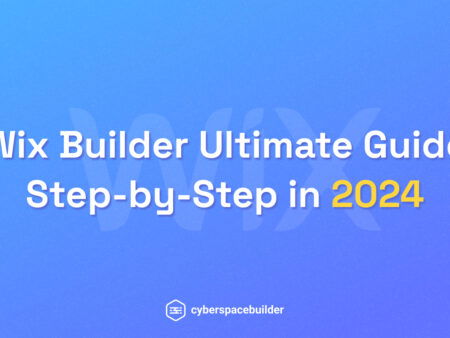Buckle up, aspiring ecommerce entrepreneur! You’re about to launch your dream online store, and the excitement is electric. But with so many options, choosing the right website builder can feel like stepping into a crowded gladiator arena. Two titans stand out – Wix and Shopify. Each is a formidable contender, but which one deserves to be your champion?
This guide will be your ultimate scouting report. We’ll meticulously analyze Wix and Shopify, dissecting their strengths and weaknesses, from pricing plans that fit your budget to user-friendliness that keeps things smooth.
We’ll delve into the heart of their offerings, comparing features crucial for any ecommerce store, like product management and marketing tools.
By the final round, you’ll be armed with the knowledge to choose the perfect platform to dominate the ecommerce battlefield and build your online empire.
Wix vs Shopify | Comparison in 2024 (Table of contents)
- Wix and Shopify: An Overview
- What is Wix?
- What is Shopify?
- Wix vs. Shopify: Pricing
- Wix vs. Shopify: Design, Features, and E-commerce Focus
- Wix vs Shopify E-commerce
- Wix vs. Shopify: Customer Support
- FAQ
1. Wix and Shopify: An Overview
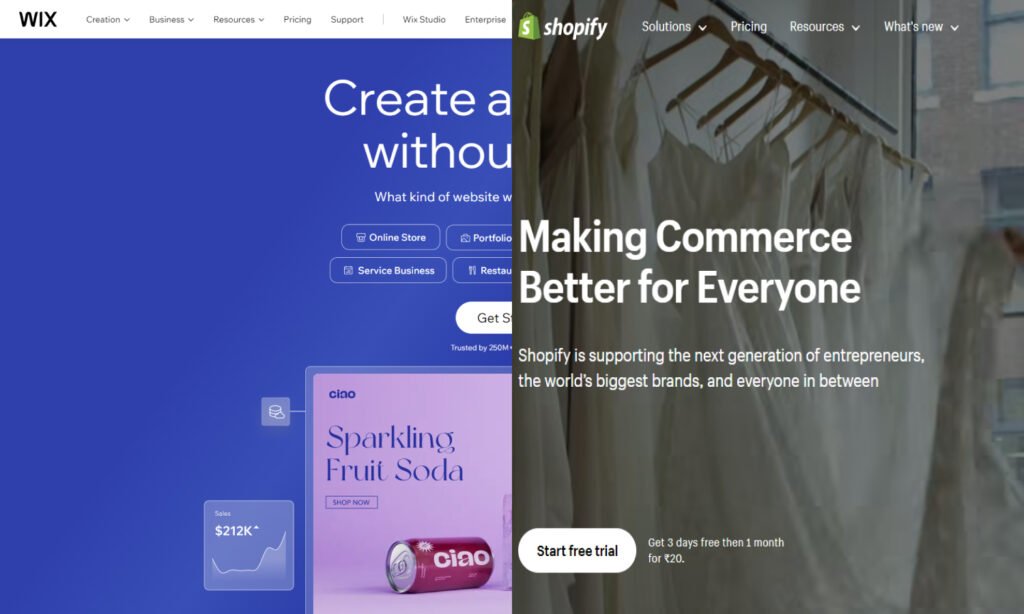
This section provides a strong overview of Wix and Shopify, highlighting their key differences in approach to website building for small businesses.
Here’s a breakdown of the key points:
- All-in-one solutions: Both Wix and Shopify offer comprehensive tools to manage your website, but with distinct specializations.
- Wix: The versatile toolbox: Wix caters to a broader range of websites with features including e-commerce functionalities.
- Shopify: Laser focus on e-commerce: Shopify is built specifically for creating and running online stores.
- Making the right choice: This guide will help you navigate this crucial decision for your specific ecommerce needs.
The roadmap outlines the upcoming comparison points:
- Foundational Differences: We’ll explore the core functionalities of each platform, understanding their origins and focus (general website builder vs dedicated e-commerce platform).
- Ease of Use: User-friendliness is a major factor. We’ll compare the editing interfaces and learning curves to see which platform is easier to use for beginners and experienced users alike.
Stay tuned for the next chapter where we’ll delve deeper into these aspects, along with pricing, key features, and how Wix and Shopify cater to different business needs!
2. What is Wix?
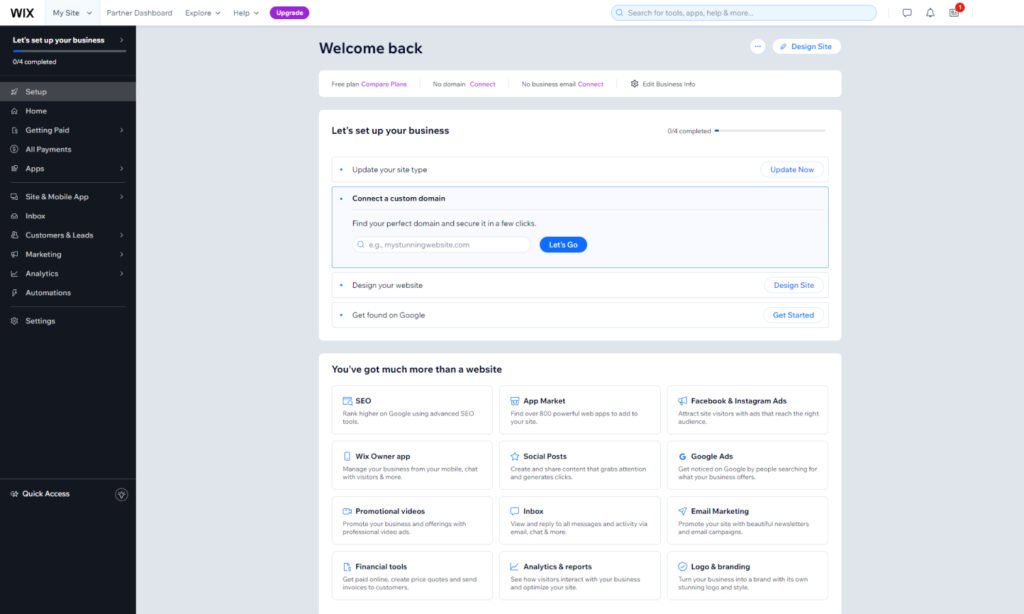
Wix is a one-stop shop for building and managing your business website, regardless of its size. Think of it as a comprehensive boot camp that equips you with all the essentials to establish a strong online presence. Here’s a closer look at what Wix offers:
- Drag-and-Drop Domination: Building a website shouldn’t feel like a battle. Wix’s user-friendly interface uses a drag-and-drop system, making it effortless to assemble your website, whether it’s an online store, a portfolio, a blog, or even a website specifically designed for your restaurant.
- Feature Flexibility: Wix extends beyond basic website creation. With a simple drag and drop, you can add functionalities like online stores, appointment booking systems, or event management tools to your site.
- Template Troopers: Wix offers a vast library of website templates that act as pre-built foundations for your website. These templates are highly customizable, allowing you to tailor them to your unique brand identity.
- Advanced Options: For those who are comfortable with coding, Wix provides the ability to craft custom web and mobile applications, giving you even more control over your online empire.
Wix is a powerful and versatile platform. Its user-friendly approach makes it ideal for beginners, while its advanced features can cater to experienced developers. However, with great design freedom comes the responsibility to ensure your website looks polished. Having a basic understanding of design trends can help you avoid creating an unconventional website.
2. What is Shopify?
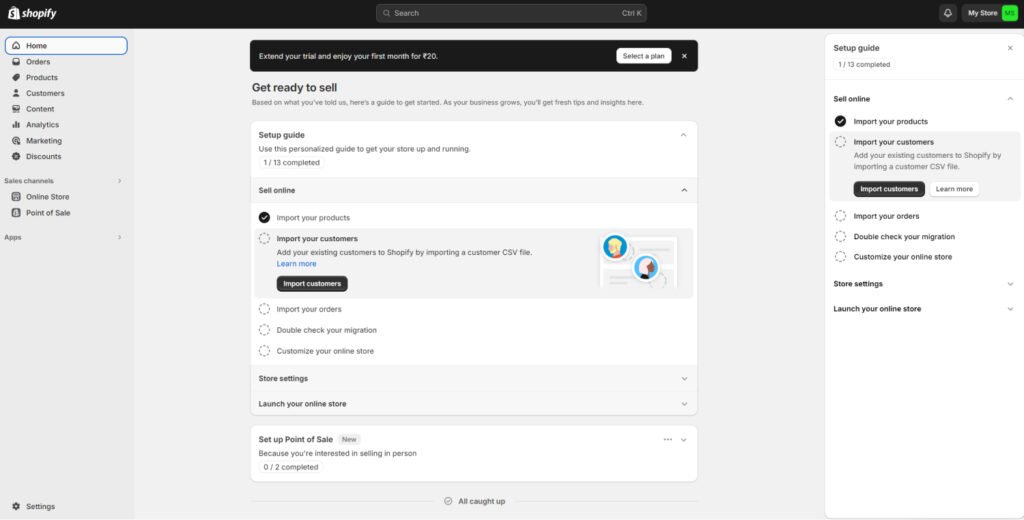
Shopify is an e-commerce platform designed specifically for businesses that want to sell products online. It goes beyond just website building and offers a comprehensive suite of features to streamline your entire online sales operation. Here’s a quick rundown of what Shopify offers:
- Ecommerce Focus: Unlike Wix, Shopify isn’t for building general websites. It specializes in helping you create and run an online store, with features tailored for ecommerce success.
- Sales Management Tools: Think of Shopify as your ecommerce war chest. It equips you with inventory management, secure payment processing, and built-in marketing tools to dominate online sales.
- Omnichannel Selling: Sell beyond your website! Reach customers on social media platforms, online marketplaces, and even physical stores with Shopify’s point-of-sale system.
- Scalable Growth: Shopify grows with your business. Their tiered pricing plans offer increasing functionality as your ecommerce needs expand.
- All-in-one Platform: Shopify streamlines your operations with features like secure payment processing, inventory management, order fulfillment, marketing tools, and sales management all built-in.
While Shopify provides website building and hosting, it’s best suited for businesses selling products. If your focus is content creation or service offerings, there might be better options. However, for anyone serious about ecommerce, Shopify’s robust features and scalability make it a powerful platform to consider.
4. Wix vs. Shopify: Pricing
Wix pricing offers
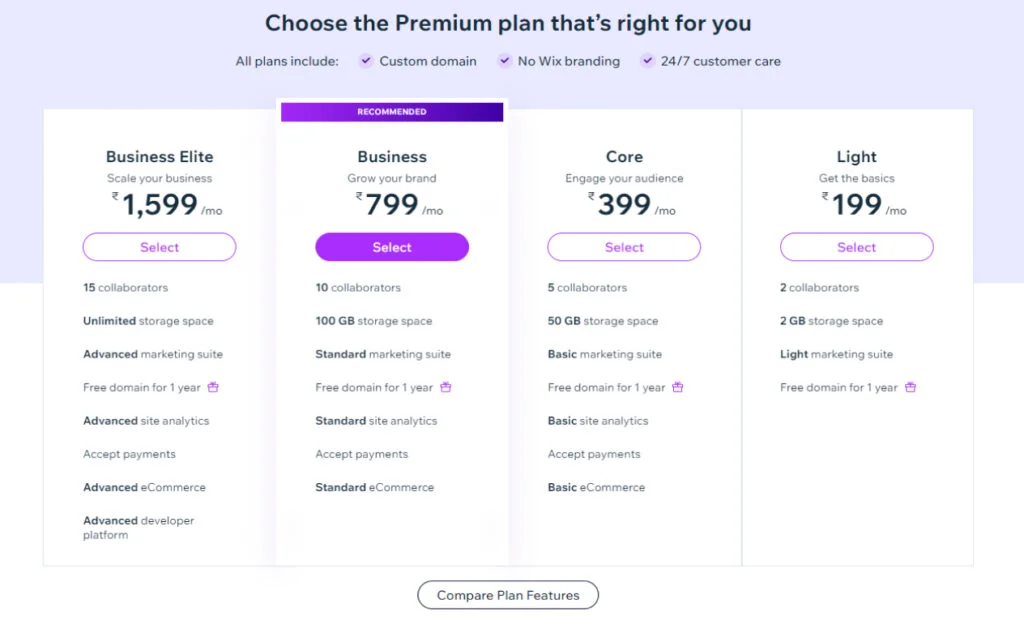
Wix offers a variety of paid plans to suit different website needs, ranging from $16 to $159 per month. Let’s explore what each plan offers:
- Light ($16/month): This is a budget-friendly option ideal for basic websites. It doesn’t include eCommerce features but provides essential marketing tools.
- Core ($27/month): Perfect for starting an online store, this plan offers features like unlimited bandwidth, a free domain for a year, sales analytics, and even a professional logo creation tool.
- Business ($32/month): This comprehensive plan expands on the Core features, providing more storage, advanced eCommerce functionalities, and additional perks like tax calculators, dropshipping capabilities, and support for multiple currencies.
- Business Elite ($159/month): Designed for high-volume businesses, this plan grants all the features from Business along with priority customer support. You’ll benefit from faster response times via phone and online channels. Additionally, advanced site analytics provide valuable insights to make data-driven decisions for your business growth.
Beyond Paid Plans:
Wix also provides a free plan that allows you to build a website with a Wix subdomain. Additionally, they offer an Enterprise solution for businesses seeking advanced scalability.
Shopify Pricing Offers
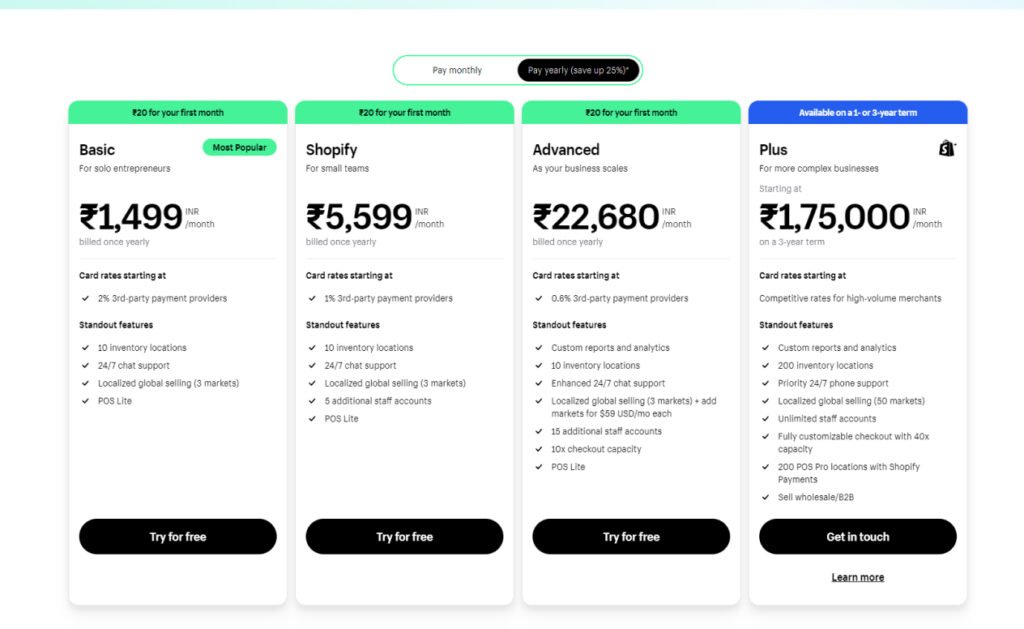
While Shopify’s plans might appear pricier compared to others, let’s explore what they offer:
- Shopify Starter ($5/month): This budget-friendly option lets you test the waters of selling online. Sell through social media, email, and SMS without building a full store. Track performance through the Shopify dashboard and leverage various marketing channels to boost sales.
- Basic Shopify ($39/month): Ideal for new businesses or those wanting a simple online store. Build a basic store with all the essential eCommerce functionalities to get started.
- Shopify ($105/month): This plan empowers growth for established businesses. It includes everything in Basic Shopify, plus advanced features like professional sales reports and global selling support.
- Advanced Shopify ($399/month): Caters to medium-to-large businesses with robust features to accelerate growth.
Limited-Time Offer:
Take advantage of Shopify’s exclusive offer! Get all plans for just $1 for 3 months (limited time). This allows you to experience the full range of Shopify features at a minimal cost before committing to a long-term plan.
Remember: While the upfront cost might be higher than some competitors, Shopify offers a comprehensive suite of features, scalability, and a limited-time discount to explore its full potential.
5. Wix vs. Shopify: Design, Features, and E-commerce Focus
Making the Perfect Platform Match
Both Wix and Shopify allow you to create a website with your custom domain name, but their approaches to website building and functionalities are quite different. Here’s a detailed breakdown to help you decide which platform best suits your goals:
Website Building:
-
Shopify: Streamlined Efficiency. Shopify offers a drag-and-drop builder with pre-designed sections. This streamlined approach makes it ideal for creating a functional e-commerce store that looks good and operates smoothly across various devices. However, this focus on efficiency comes with limited design freedom. You won’t have the same level of creative control as with Wix.
-
Wix: Unleash Your Creativity (with Caution). Wix offers a freeform drag-and-drop editor that provides maximum flexibility. You can place elements virtually anywhere on the page. This is great for crafting unique and visually striking websites, but it requires some design knowledge to avoid a cluttered or confusing layout.
Features:
-
Shopify: E-commerce Champion. Shopify is laser-focused on providing functionalities specifically designed for e-commerce success. Finding and implementing features for product sales, inventory management, order fulfillment, and customer service is a breeze. However, Shopify offers fewer features outside of the e-commerce realm.
-
Wix: Feature Jack-of-All-Trades. Wix caters to a broader range of websites. It provides tools for various business types, including restaurants (online ordering, reservations), service businesses (appointment scheduling), events (ticketing), and even blogs. While Wix offers a wider range of features, utilizing them fully might require more technical knowledge compared to Shopify’s e-commerce-specific platform.
Choosing Your Champion:
By understanding these key differences, you can make an informed decision. If you prioritize absolute design freedom and cater to a wider range of website needs, Wix might be a good fit. However, if your primary focus is building a robust and functional online store, and you’re comfortable with a more structured approach, Shopify is the way to go.
6. Wix vs Shopify E-commerce
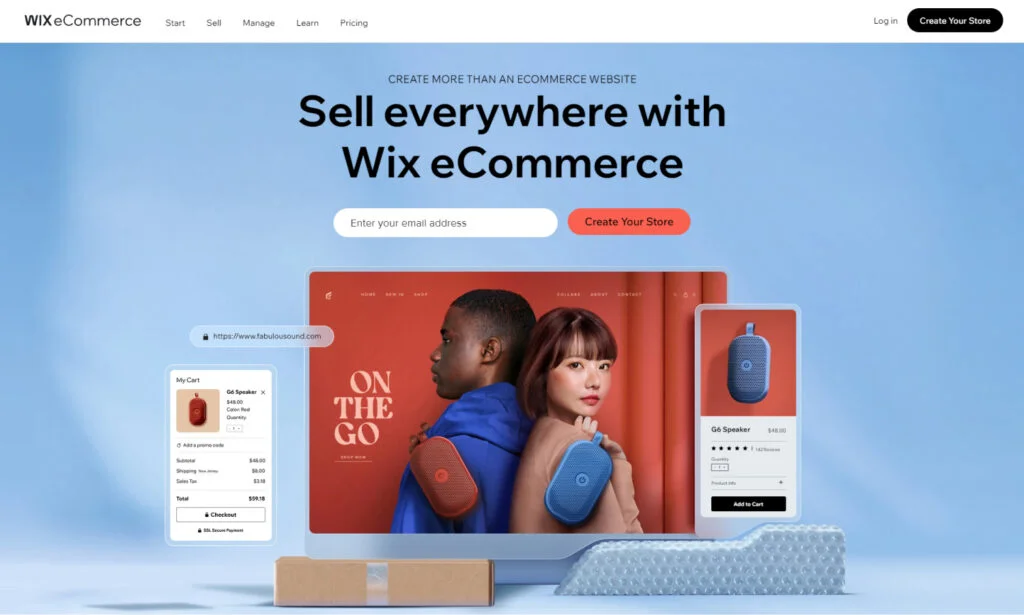
Wix Wix allows you to create an online store, but its e-commerce functionalities are more basic compared to Shopify. It might be suitable for:
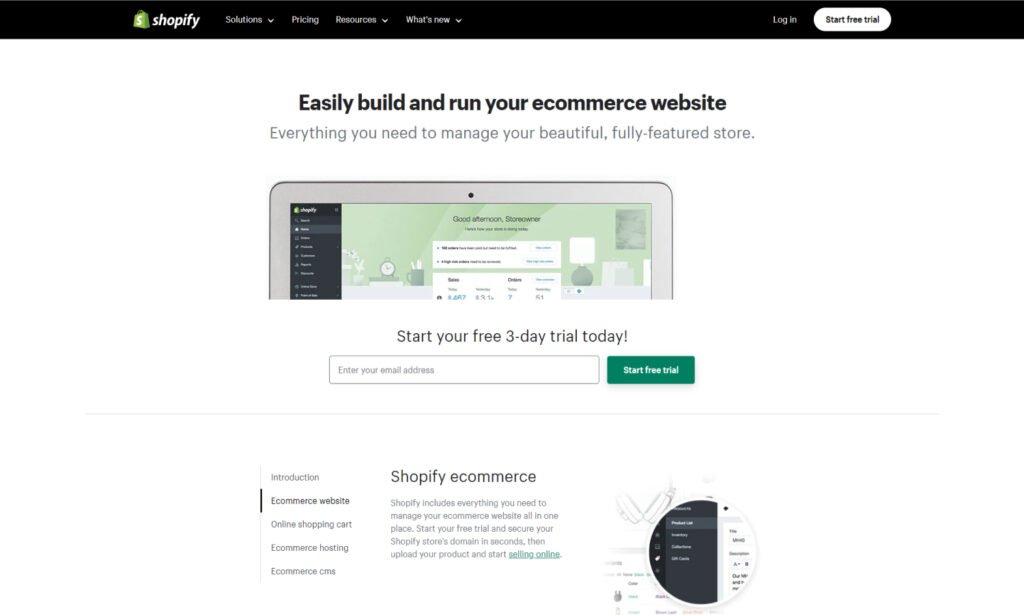
Shopify reigns supreme when it comes to building a full-fledged online store. It offers a powerful arsenal of features designed to streamline your sales process and maximize customer satisfaction:
- Pricing: Shopify plans can be more expensive than Wix, especially for larger stores requiring advanced features.
- Payment Processing: The number of integrated payment processors might be limited compared to Wix.
7. Wix vs. Shopify: Customer Support.
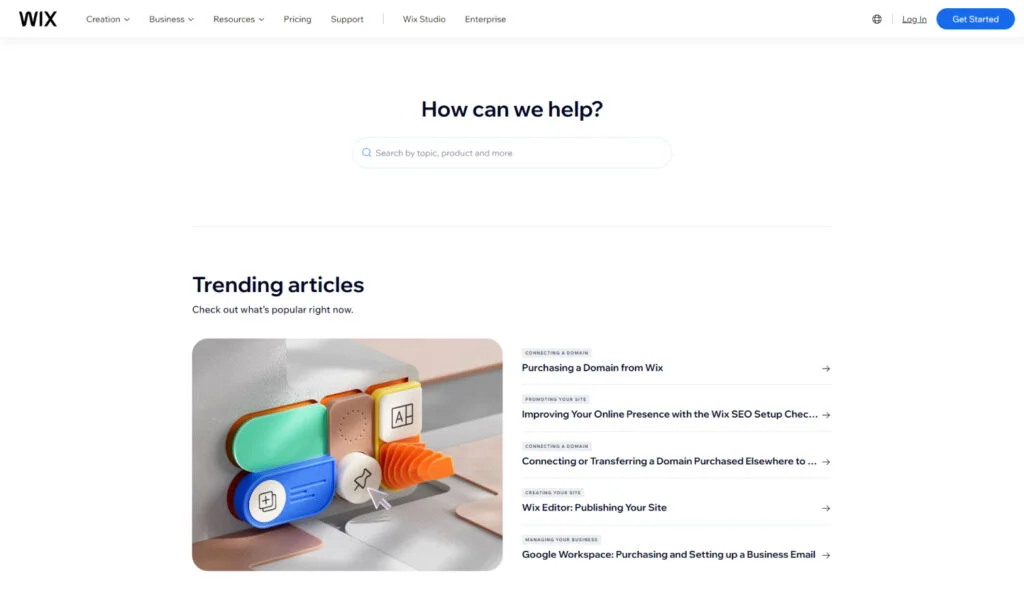
Wix
Wix provides 24/7 phone support for English inquiries. This can be a plus for those who prefer direct interaction with a customer service representative. They utilize a callback system, meaning you provide your phone number and wait for them to call you back.
However, keep in mind the limitations:
- Limited Language Support: 24/7 phone support is only available in English. Support for other languages has restricted hours.
- Potential Wait Times: Callback systems can lead to waiting times, especially during peak hours.
- Paid Design Services: If you require in-depth website design assistance beyond basic customer support, Wix offers paid professional design services.
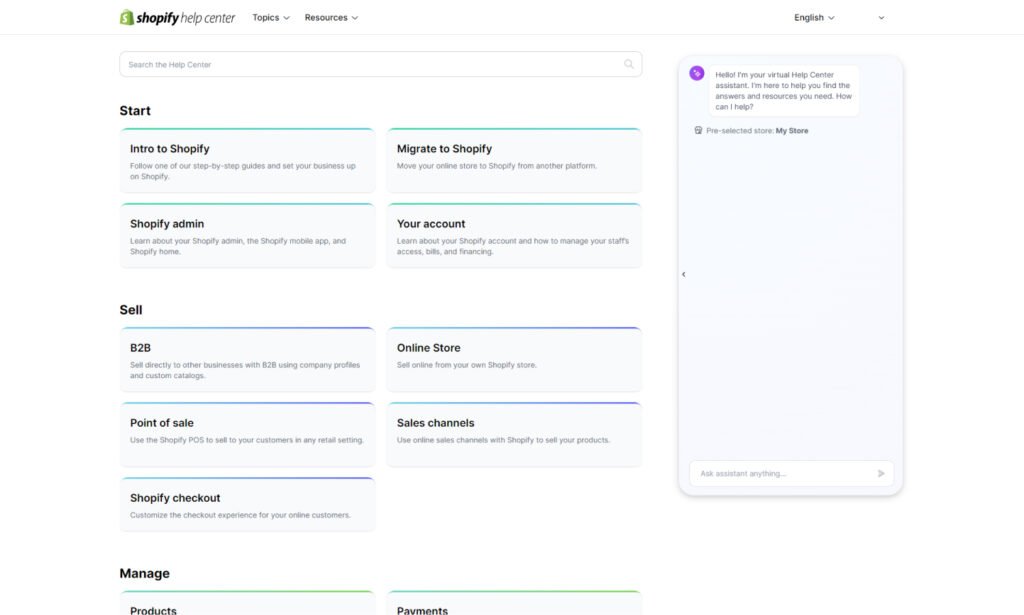
Shopify
Shopify prioritizes online support channels. You can access their help center 24/7, which features a comprehensive knowledge base, FAQs, and tutorials. They also offer:
- Email Support: Submit your inquiries via email and receive detailed responses from the support team.
- Live Chat Support: Get real-time assistance through live chat for immediate answers to simpler questions.
- Callback Support (Limited): Callback support availability might vary depending on your Shopify plan. Higher-tier plans often prioritize callback support for faster resolution of complex issues.
Choosing the Right Support:
- Prioritize phone support? Choose Wix if you value direct phone contact and don’t mind potentially waiting for a callback.
- Need multilingual support? If you require support in a language other than English, Shopify might be a better option due to its wider range of languages, even if support hours are limited.
- Comfortable with online resources? Shopify’s extensive online help center and live chat can be valuable resources for self-sufficient users who prefer to find solutions independently.
8. Frequently Asked Question
Q: What is the difference between Wix and Shopify?
A: Wix is a website builder that also offers ecommerce capabilities, while Shopify is primarily an ecommerce platform that allows you to build online stores.
Q: How do Wix and Shopify compare in terms of website building?
A: Wix is known for its user-friendly drag-and-drop editor, making it easy for beginners to create websites. Shopify, on the other hand, offers more advanced customization options suited for online stores.
Q: Which platform should I choose between Wix and Shopify for my online store?
A: If you’re looking for a simple and easy-to-use solution, Wix might be the right choice. For more advanced ecommerce features and scalability, Shopify is recommended.
Q: Can you explain the difference in usage between Wix and Shopify?
A: Wix is commonly used for building websites, including online stores, while Shopify is specifically designed for ecommerce functionalities such as inventory management and payment processing.
Q: What are the advantages of using Shopify over Wix?
A: Shopify offers a wide range of apps and integrations, as well as a dedicated Point of Sale system for retail stores. Additionally, Shopify provides advanced ecommerce features compared to Wix.
Q: How does Wix compare to Shopify in terms of payments and fees?
A: While both platforms offer payment processing options, Shopify’s payment system is known to be more robust and integrated. Shopify does have subscription fees, whereas Wix can be used for free with limited features.
Q: Can you give an overview of the comparison between Wix and Shopify?
A: Wix is simpler to use and more suitable for small businesses or personal websites, while Shopify is geared towards businesses looking to scale their online presence and sales.
